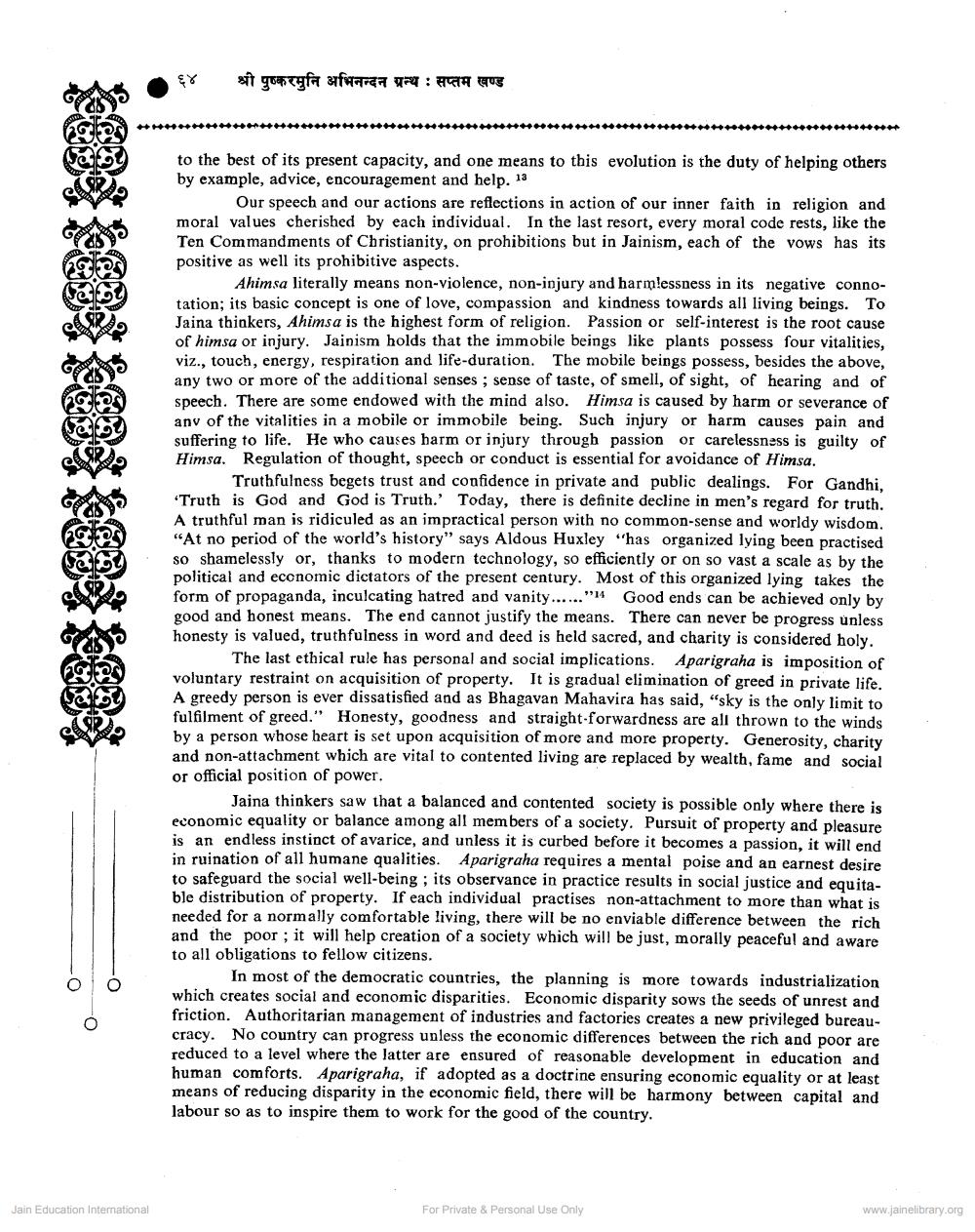________________
०६४
श्री पुष्करमुनि अभिनन्दन ग्रन्थ : सप्तम खण्ड
to the best of its present capacity, and one means to this evolution is the duty of helping others by example, advice, encouragement and help. 13
Our speech and our actions are reflections in action of our inner faith in religion and moral values cherished by each individual. In the last resort, every moral code rests, like the Ten Commandments of Christianity, on prohibitions but in Jainism, each of the vows has its positive as well its prohibitive aspects.
Ahimsa literally means non-violence, non-injury and harmlessness in its negative connotation; its basic concept is one of love, compassion and kindness towards all living beings. To Jaina thinkers, Ahimsa is the highest form of religion. Passion or self-interest is the root cause of himsa or injury. Jainism holds that the immobile beings like plants possess four vitalities, viz., touch, energy, respiration and life-duration. The mobile beings possess, besides the above, any two or more of the additional senses; sense of taste, of smell, of sight, of hearing and of speech. There are some endowed with the mind also. Himsa is caused by harm or severance of any of the vitalities in a mobile or immobile being. Such injury or harm causes pain and suffering to life. He who causes harm or injury through passion or carelessness is guilty of Himsa. Regulation of thought, speech or conduct is essential for avoidance of Himsa.
Truthfulness begets trust and confidence in private and public dealings. For Gandhi. Truth is God and God is Truth. Today, there is definite decline in men's regard for truth. A truthful man is ridiculed as an impractical person with no common sense and worldy wisdom. “At no period of the world's history” says Aldous Huxley "has organized lying been practised so shamelessly or, thanks to modern technology, so efficiently or on so vast a scale as by the political and economic dictators of the present century. Most of this organized lying takes the form of propaganda, inculcating hatred and vanity... ..."14 Good ends can be achieved only by good and honest means. The end cannot justify the means. There can never be progress unless honesty is valued, truthfulness in word and deed is held sacred, and charity is considered holy.
The last ethical rule has personal and social implications. Aparigraha is imposition of voluntary restraint on acquisition of property. It is gradual elimination of greed in private life. A greedy person is ever dissatisfied and as Bhagavan Mahavira has said, “sky is the only limit to fulfilment of greed." Honesty, goodness and straight-forwardness are all thrown to the winds by a person whose heart is set upon acquisition of more and more property. Generosity, charity and non-attachment which are vital to contented living are replaced by wealth, fame and social or official position of power.
Jaina thinkers saw that a balanced and contented society is possible only where there is economic equality or balance among all members of a society. Pursuit of property and pleasure is an endless instinct of avarice, and unless it is curbed before it becomes a passion, it will end in ruination of all humane qualities. Aparigraha requires a mental poise and an earnest desire to safeguard the social well-being; its observance in practice results in social justice and equitable distribution of property. If each individual practises non-attachment to more than what is needed for a normally comfortable living, there will be no enviable difference between the rich and the poor ; it will help creation of a society which will be just, morally peaceful and aware to all obligations to fellow citizens.
In most of the democratic countries, the planning is more towards industrialization which creates social and economic disparities. Economic disparity sows the seeds of unrest and friction. Authoritarian management of industries and factories creates a new privileged bureaucracy. No country can progress unless the economic differences between the rich and poor are reduced to a level where the latter are ensured of reasonable development in education and human comforts. Aparigraha, if adopted as a doctrine ensuring economic equality or at least means of reducing disparity in the economic field, there will be harmony between capital and labour so as to inspire them to work for the good of the country.
o
o
Jain Education International
For Private & Personal Use Only
www.jainelibrary.org




